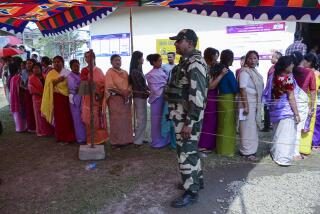New leader of Indian capital abandons sit-in
NEW DELHI – The populist, controversial new leader of India’s capital city on Tuesday called off a two-day sit-in that had snarled traffic, created headaches and raised questions about his upstart party’s national aspirations.
Arvind Kejriwal, a bookish former tax official whose party stunned India by winning control of New Delhi’s regional government last month, staged the sit-in partly to demand greater control of the city’s police force, which is under the command of the central government.
But analysts say Kejriwal also was trying to create buzz for his Aam Aadmi Party ahead of national elections due in May. The party, whose name translates to “common man,” won a surprising number of seats in local legislative elections in northern India in December by railing against official corruption and capitalizing on widespread dissatisfaction with the ruling Indian National Congress party.
A scarf wrapped around his head, Kejriwal spent Monday night sleeping on the pavement outside the Interior Ministry in the stately, barricaded center of New Delhi’s government district, where hundreds of protesters joined him.
It was a remarkable move by a chief minister – a post similar to a governor in the United States – to protest on the streets of his own capital. Kejriwal had vowed a 10-day demonstration but called it off Tuesday evening, hours after police briefly clashed with protesters who had toppled a barricade and threatened to burst through a police line.
The scenes fueled fears of chaos in the city of 16 million, but Kejriwal said afterward that “the people of Delhi have won.” He and his allies have shrugged off criticisms that the longtime anti-corruption campaigner’s insurgent style is ill suited to running one of Asia’s largest metropolises.
“I came at 8:30 in the morning supporting Kejriwal,” said Kamna Sotra, a university student who joined the protest Tuesday. “I support his views. No C.M. [chief minister] will ever sleep out in the cold for my rights.
“I come from a family of Congress [party] supporters,” she added. “My father warned me against joining the protest today, but I had to go.”
Crowds in white caps, waving Indian flags, braved a chilly rain Tuesday as women in traditional shalwar kameez outfits tried to get past police barricades to get closer to Kejriwal. Police used wooden sticks known as lathis to disperse the crowd. At one point, four policemen beat a man’s legs until he fell to the ground and tried to crawl away; the policemen eventually lifted the man back to his feet.
The protest came after a minister in Kejriwal’s government allegedly accosted four Ugandan women in a Delhi neighborhood and accused them of running a drugs and prostitution racket. Police refused to search for evidence, saying they didn’t have a warrant, and news of the incident prompted allegations of racism and harassment against Kejriwal’s party.
Kejriwal sought to turn the charges around, accusing the police of failing to curb sexual assaults against women in Delhi, which has seen a spate of high-profile rape cases.
“Delhi is becoming a lawless land,” said Anil Kumar, 26, a businessman who participated in the protests. “We want the Delhi police to be under the Delhi government, because the center has failed us – not once, not twice, but time and again.”
Away from the streets, Kejriwal’s tactics have sharply divided India’s chattering class. An editorial this week in the Times of India said his party’s “mandate is for improving law and order, not subverting it.” Sadanand Dhume, an India expert at the American Enterprise Institute in Washington, dismissed the sit-in as “political vaudeville.”
Sharma is a Times special correspondent. Times staff writer Bengali reported from Mumbai, India.
More to Read
Start your day right
Sign up for Essential California for news, features and recommendations from the L.A. Times and beyond in your inbox six days a week.
You may occasionally receive promotional content from the Los Angeles Times.







